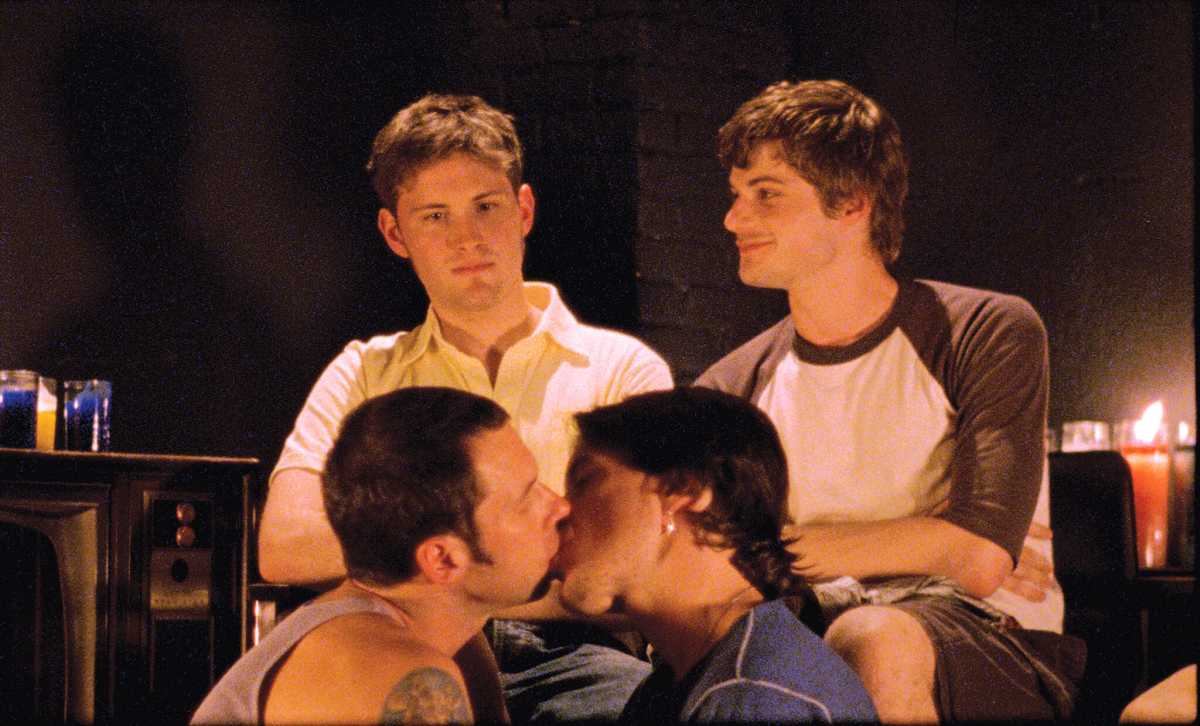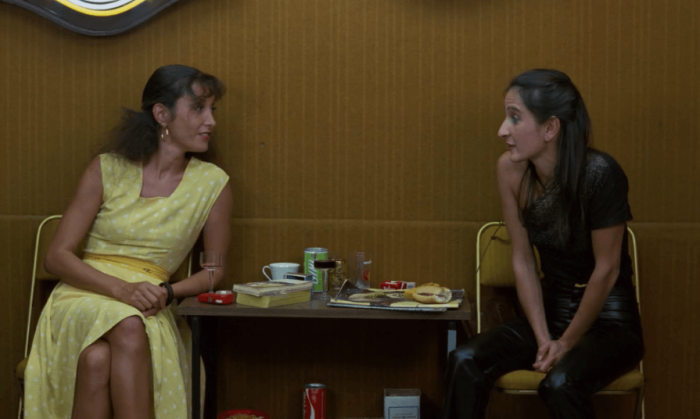Fifteen years after it was made, John Cameron Mitchell’s provocative 2006 film, “Shortbus,” is getting a 4K restoration and theatrical re-release. One of the storylines involves James (Paul Dawson), a depressed ex-hustler, and his boyfriend Jamie (PJ DeBoy, Dawson’s real-life partner), who open their relationship up to include Ceth (Jay Brannan). Meanwhile, their neighbor, Caleb (Peter Stickles), is spying on and stalking James, whom he secretly desires.
Many of the characters, which include Sophia (Sook-Yin Lee), a couple’s counselor, and Severin (Lindsay Beamish), a dominatrix, congregate at Shortbus, a “salon for the gifted and challenged,” hosted by Mx. Justin Vivian Bond, which has an anything-goes vibe. The film allows these characters to explore their sexuality and their identity — and invites viewers to go along for the ride.
Gay City News chatted with Dawson about the film — and his thoughts about it — as well as his experience playing James 15 years later.
What do you think about “Shortbus” looking back on this film 15 years later? Does it still seem risky or does it feel quaint? Was the film ahead of its time? Do you think it moved the needle as it was promoted?
I think we wanted it to be the beginning of change, and more openness, and that really hasn’t happened. Looking back, like “Caligula” in the 1970s, we hoped to expand people’s imagination about differences between porn and seeing sex that wasn’t pornography. That, perhaps, was a naïve goal. People have strict ideas about what they believe. But I think “Shortbus” has aged well. I think it was not ahead of its time, but prescient in ways. It offers an interesting perspective into our society today to see how things have changed in the last 15 years.
Watching it again, I was transfixed by your performance. Yes, you are very naked and engage in some rather explicit sex, but your character is in tremendous emotional pain, and your fragility and vulnerability impacted me far more this time. Can you talk about being vulnerable on screen?
The sex and nudity are a part of that. Part of James’ pain has to do with sexuality, and that he struggles to love himself because of his sexuality — because of what he was “taught” about gay people and being gay. It’s part of his torture — but only a part of it. It was sometimes frustrating to have people so taken with the sex, and the novelty of the sex, in narrative film that the focus was so on that. But I often equated [James’] cumming and crying in the opening scene as two parts of the same thing. Some people thought: You can’t have an orgasm and not break character, but it’s really no different than crying for a film.
Did you think or hope the exposure from this film would lead to more screen roles?
Of course, you hope for the best, but I really came into this film when I was in my 30s, and I had already been in show business for about 10 years and I had experienced great moments and I had experienced many ugly behind-the-scenes machinations that make it a brutal and unfair business. I was in Hawaii when I came back to New York to start working on the film. I had to weigh why I was doing it, and it came down to even if this is the last film I do, there’s a good chance here that we might make a film that people will remember 15-20 years down the road. In that sense, it was nothing but a win for me. We made a film that people say has changed their lives, or someone said to me, “This film saved my life.” Those are big rewards. I’ll take that any day. For me, it was a risk that was worth taking.
You were with PJ prior to making the film. Are you still with him? If it’s not too personal, did making this film impact your relationship in any way?
Well, sure. But we had great times together because of it, and hard times together because of it. And either way, we were together. A lot of people were mistaking us for the characters, and some of their behavior was mistaken as ours. We’ve been together 20 years now.
What observations do you have about the film and your life after “Shortbus?”
PJ and I left New York together 10 years ago, and at that point, I stopped pursuing acting. I’ve done lots of things. I’m a graphic artist. I think I value privacy more than attention. I do write some, but I haven’t had the desire to share — not even on Instagram. Part of that is the world that we live in now. It’s just become a much meaner world. That is what’s interesting about the film, for me, in terms of how the world has changed since 2006 when “Shortbus” came out. It came out the month after Facebook opened up to everyone and three months before the first iPhone was introduced. “Shortbus” was the last place people could go out and feel [reckless] abandon, do anything, and be anybody they wanted to be without fear of being captured on film — which is something we’ve lost since then. James says to Severin, “You take that camera everywhere,” like it’s such a novel thing — you’re an artist. Now everybody has a camera and takes it everywhere. But we’re not all artists!
Your character James films himself, but it’s for a private project. Given the way the world has changed and the advent of social media and this look-at-me mindset, how do you think the film reads regarding our putting ourselves out there on screen world?
Back when digital cameras first became accessible, around 2000, I became obsessed with taking pictures of everything and had this desire to capture my life and record my life. Now that there is an app for that, I couldn’t be less interested in doing it. Part of that is because social media is such a perfect forum for bullies and trolls and cowards. So, to put your life out there and your precious, vulnerable bits, it’s dangerous. It’s like feeding it to the dogs. I found myself withdrawing from that. In a way, I think the world has become more closed, so “quaint” is perhaps a more appropriate way of seeing it.
John Cameron Mitchell and select cast members will be doing in-person Q&As on January 26 and 27 following the 7 p.m. show. For more information, visit: https://www.ifccenter.com/films/shortbus/
SHORTBUS | Directed by John Cameron Mitchell | Opening January 26 at the IFC Center | Distributed by Oscilloscope Laboratories



































